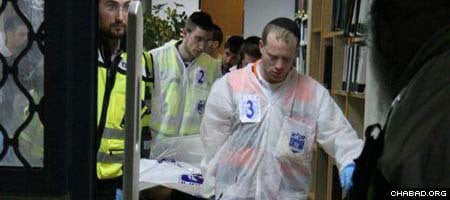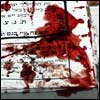JERUSALEM, Israel – Jewish men and women from all walks of life confronted on Thursday the national pain resulting from an unprecedented terrorist attack on one of Judaism's most famous yeshivas.
That night, an Israeli-Arab walked into the Mercaz Harav seminary in the Kiryat Moshe section of Jerusalem with a concealed automatic rifle. He opened fire on a group of teenage boys and young men immersed in their studies, firing an estimated 500-600 bullets in the span of 10 minutes and killing eight. An off-duty soldier later felled the gunman.
Families laid the slain to rest on Friday. It was the worst terrorist attack to strike Israel's capital in four years.
As condemnation of the massacre poured in from governments around the world, synagogues everywhere said a special prayer for the dozen or so wounded. At a Chabad-Lubavitch synagogue in the town of Ramat Bet Shemesh just 30 minutes from Jerusalem, congregants implored G‑d for a blessing for the students during their morning services.
At about the same time halfway around the world, Rabbi Dov Wagner, co-director of the Chabad Jewish Student Center at the University of Southern California, was leading some 40 students at the college in a prayer vigil for those murdered. He noted that the attack happened on the first day of the Hebrew month of Adar, which Jewish tradition regards as a particularly happy occasion.
"There's so much to talk about and analyze: Why we should be happy, what true joy means, how we celebrate," Wagner told the students. "But then came news of the attack in Jerusalem earlier tonight.
"These were children in a yeshiva I know, a yeshiva that some of our alumni, USC graduates, have studied in," he continued. The gunman "didn't hate them. They had never done anything to him personally. They were engaged in the most innocent and holy of activities. But he hated what they represented. He hated me and you."
At California State University, Northridge, freshman Leeor Engelstein, who studied part-time at Mercaz Harav last year, said that he was "shocked and very upset."
"I called up my friends right away," said Engelstein, who attends some programs at his campus' Chabad House. "Thank G‑d, they're all okay."
Responding to Tragedy

"We right away started praying Psalms for the students," said Slonim. "Some Chabad Chasidim who volunteer for the Hatzala emergency service went right away to see how they could help. Parents of some of the students were worried because we're so close.
"This happened to our neighbors," he continued. "We're all friends. We all know each other. It's like when a soldier goes down, all the other soldiers pull together."
Slonim added that he's coordinating Shabbat services and meals at Shaarei Tzedek Hospital, where some of the injured were transported.
At the Chabad Terror Victims Project run by the Chabad-Lubavitch Youth Organization in Israel, Rabbi Menachem Kutner said that because the victims came from religious families and small communities, support networks are already in place to help their families during the seven-day period of mourning known as shiva.
"Our connection and our help will be in the long-term," said the rabbi, who will be visiting the injured in the hospitals and seeing what his organization can do for them. "Neighbors will return to their normal routines. We will then help each family in whatever they need."
Back in California, Wagner drew a parallel to a similar attack that happened 52 years ago in the Chabad-Lubavitch village of Kfar Chabad in central Israel. Back then, an Arab gunman walked into the synagogue of the village's agricultural school and opened fire on a crowd of immigrant students and their teachers. He killed five children and one teacher, and injured 10 others.
"As always, we search for guidance," he said. "Do we cancel the celebrations of this month, choosing to express ourselves through mourning and grief? Do we cry out for vengeance?"
Several days after the Kfar Chabad attack, the Rebbe, Rabbi Menachem Mendel Schneerson, of righteous memory, sent a telegram to the village's residents. Significantly, it contained three Hebrew words – behemshech habinyan tinacheimu – which means, "By your continued building, will you be comforted."
"Judaism believes in tears," asserted Wagner. "We believe in crying and expressing our grief. But we do not believe in paralysis.
"We will make the lives of those students meaningful," he continued. "We will continue to tap into the very faith, the very celebration, the very joy that the enemy attempts to extinguish."
Kutner saw in the attack a reminder of how many enemies the Jewish people face.
"We see again that even though Jerusalem had a few years of quiet, the quiet can in one moment turn into such a difficult and painful tragedy," he said.
Quoting a verse from the Haggada, the order of the Passover service that will be held in just six weeks time, he said: "In every generation, enemies rise up against us, but we believe that G‑d will save us from their hands."






Start a Discussion